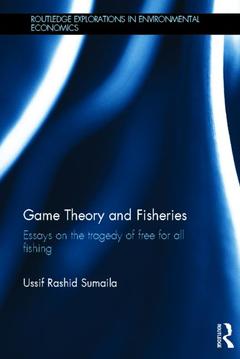Description
Game Theory and Fisheries
Essays on the Tragedy of Free for All Fishing
Routledge Explorations in Environmental Economics Series
Author: Sumaila Ussif Rashid
Language: English
Subjects for Game Theory and Fisheries:
Keywords
Carbon Capture; Carbon Trading; Climate Change; Conservation; Game Theory; Natural Resources; Fisheries; Cost-Benefit Analysis; Discounting; Environmental Finance; Environmental Policy; Global Warming; Permit Trading; Sustainability; Sustainable Development; North East Atlantic Cod; IUU Catch; Decreased Discount Rate; Marine Protected Areas; Subgradient Projection; Vessel Groups; Small MPA; Coastal Vessels; Purse Seine; Stock Size; Catchability Coefficient; ITQ System; Intrinsic Growth Rate; Coastal Fleet; Non-cooperative Management; Net Migration Rate; North East Arctic Cod; Unprotected Area; Freezer Trawlers; Ice; Resource Rent; Longline Fleets; Tuna Stocks; MENA Region Country; SSB
Approximative price 172.36 €
In Print (Delivery period: 14 days).
Add to cartPublication date: 08-2013
Support: Print on demand
Approximative price 56.31 €
In Print (Delivery period: 14 days).
Add to cartPublication date: 11-2016
· 15.6x23.4 cm · Paperback
Description
/li>Contents
/li>Readership
/li>Biography
/li>
Today, there is a growing sense of urgency among fisheries scientists regarding the management of fish stocks, particularly among those who predict the imminent collapse of the fishing industry due to stock depletion. This book takes a game theoretic approach to discussing potential solutions to the problem of fish stock depletion. Acknowledging the classification of fish stocks as destructible renewable resources, these essays are concerned with the question of how much of the stock should be consumed today and how much should be left in place for the future.
The book targets both economists and students of economics who are familiar with the tools of their trade but not necessarily familiar with game theory in the context of fisheries management. Importantly, the goal is not to give a summary evaluation of the current views of the ?appropriate? response to immediate policy questions, but rather to describe the ways in which the problems at hand can be productively formulated and approached using game theory and couched on real world fisheries.
Game Theory and Fisheries consists of twelve previously published but updated articles in fisheries management, a number of which address a gap in the fisheries literature by modelling and analysing the exploitation of fishery resources in a two-agent fishery, in both cooperative and non-cooperative environments. The author?s work ultimately illustrates that the analysis of strategic interaction between those with access to shared fishery resources will be incomplete without the use of game theory.
1. Introduction 2. Game Theoretic Models of Fishing 3. Cooperative and Non-cooperative Management when Capital Investment is Malleable 4. Cooperative and Non-cooperative Management when Capital Investment is Non-Malleable 5. Strategic Dynamic Interaction: The case of Barents Sea fisheries 6. Cannibalism and the Optimal Sharing of the North-East Atlantic Cod Stock 7. Implications of Implementing an ITQ Management System for the Arcto-Norwegian Cod Stock 8. Marine Protected Area Performance in a Game Theoretic Model of the Fishery 9. Distributional and Efficiency Effects of Marine Protected Areas 10. Playing Sequential Games with Western Central Pacific Tuna Stocks 11. Impact of Management Scenarios and Fisheries Gear Selectivity on the Potential Economic Gains from a Fish Stock 12. Managing Bluefin Tuna in the Mediterranean Sea
Ussif Rashid Sumaila is Professor and Director of the Fisheries Economics Research Unit at the University of British Columbia’s Fisheries Centre, Canada. He specializes in bioeconomics, marine ecosystem valuation and the analysis of global issues such as fisheries subsidies; illegal, unreported and unregulated fishing; and the economics of high and deep seas fisheries.




